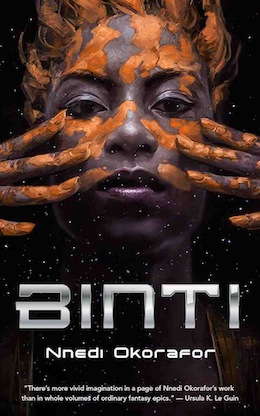In Nnedi Okorafor’s new novella, the titular Binti has left home for the very first time at age 16. Unknown to her parents or siblings, she has accepted a place to study at the prestigious Oomza Uni, a distant planet with only a 5% human population but filled with those from many planets who are ‘obsessed with knowledge, creation, and discovery’. Binti can not bring herself to tell her family that she is going—no one in her family has left their part of the earth, let alone the entire planet—and so she sneaks off to join the other students leaving for Oomza Uni, following her desire to learn regardless of the hostile treatment she receives from strangers at the launch port, people who can not understand why she is covered in red clay, why her hair is thickly rolled in it, and why she isn’t like anyone else they’ve ever seen.
Some spoilers ahead.
Binti is of the Himba poeple, a tribe in Namibia who use ‘sweet smelling otjize’, a mixture of ochre and butterfat over their skin, rolling it into their hair as protection against the desert sun. The Himba, as Binti points out, ‘don’t travel’. ‘We stay put,’ she says, ‘Our ancestral land is life; move away from it and you diminish. We even cover our bodies with it. Otjize is red land.’ But Binti’s tribe are also great proponents of and developers of superior, sophisticated technology, her father having passed three hundred years of oral knowledge about circuits, currents and mathematics to her, helping her become a ‘master harmonizer’ at age 12, communicating with the ‘spirit flow’ and convincing them to become one current.
But though Binti’s tribe is ‘obsessed with innovation and technology’, they remain ‘small, private, and [do not] like to leave Earth’. They ‘prefer to explore the universe by travelling inward, as opposed to outward’, with Binti herself ‘treeing’ into a sort of trance like clarity when need be. And yet, she leaves home and boards a ship, a ‘magnificent piece of living technology’ alongside many, many strangers, some of whom become her friends within a few days of travel. She is comfortable and the happiest she has ever been, until one perfectly average day on the lengthy voyage between planets, the dreaded Meduse board the ship and violently destroy everyone on it. The Meduse are strange, jellyfish like creatures probably inspired by the ‘little blue jellyfish…swimming in the Khalid Lagoon that Sunday day in Sharjah’ that Okorafor has dedicated the novella to. The aliens ‘move like water when at war’ and ‘there is no water on their planet, but they worship water as a god. Their ancestors came from water long ago’. But now the Meduse are space terrorists, violently destroying whatever stands in their way, wreaking havoc across deep space. Everyone on the Oomza Uni ship is dead except Binti, who is untouchable to the Meduse, thanks to an ‘edan’ she found years ago exploring the desert, a ‘device too old for anyone to know its functions, so old that [it is] now just art’. But it is through this device, Binti is eventually able to communicate with the Meduse. Okorafor describes the first time Binti understands the Meduse wonderfully: ‘through the clearest silence I’d ever experience, so clear, that the slightest sound would tear its fabric, I heard a solid oily low voice say, ‘Girl’. Communicating with the Meduse helps Binti understand why they do what they do, but ‘just because something isn’t surprising doesn’t mean it’s easy to deal with’.
The Arabic word binte or binti means ‘daughter of’. Okorafor’s Binti is more than just the daughter and representatives of her gifted parents and of the Himba. She is the sole representative of the human species when she remains the only thing standing between the Meduse and the destruction of the entire population of Oomza Uni. She’s smart, proud of her heritage and an fully realised, relatable protagonist, which makes her her eventual association with the Meduse and spectacular evolution all the more poignant. We see clearly that Binti really is the future and though she may have to give up some of her past to move forwards, she finds a way to remain true to her heritage.
There’s a lot going on below the surface of Binti, as there always is in Okorafor’s work. Her language is always simple, deceptively so, since there are multiple intriguing ideas and concepts at play in the narrative. As with many of Okorafor’s shorter works, Binti too is brimful of ideas that could easily be played out in greater detail, perhaps in other stories. The technology of the astrolabe communication device; the idea of ‘treeing’ and reaching a zen state via mathematics; the ship that is actually a large living creature, the idea of intergalactic species being connected to each other and yet choosing to remain racist or judgmental of different cultures within their own species—all this adds up to very effective and clever world building.
What is most important about Okorafor’s work is that she sees diverse races and cultures as being just as much of the future as they are of the present—something mainstream SF doesn’t always do. Not just does she put Africans from all over the continent in the futures she creates with great clarity and purpose, she makes certain that their various cultures travel forward with them, informing these futures, maintaining unique customs. Okorafor’s stories are where the ancient cultures of Africa meet the future, where what we have been and what makes us human meets what we can be and what we may be in the future.
Binti is available paperback, ebook, and audio formats September 22nd from Tor.com
Read an excerpt from the novella here.
Mahvesh loves dystopian fiction & appropriately lives in Karachi, Pakistan. She writes about stories & interviews writers the Tor.com podcast Midnight in Karachi when not wasting much too much time on Twitter.










